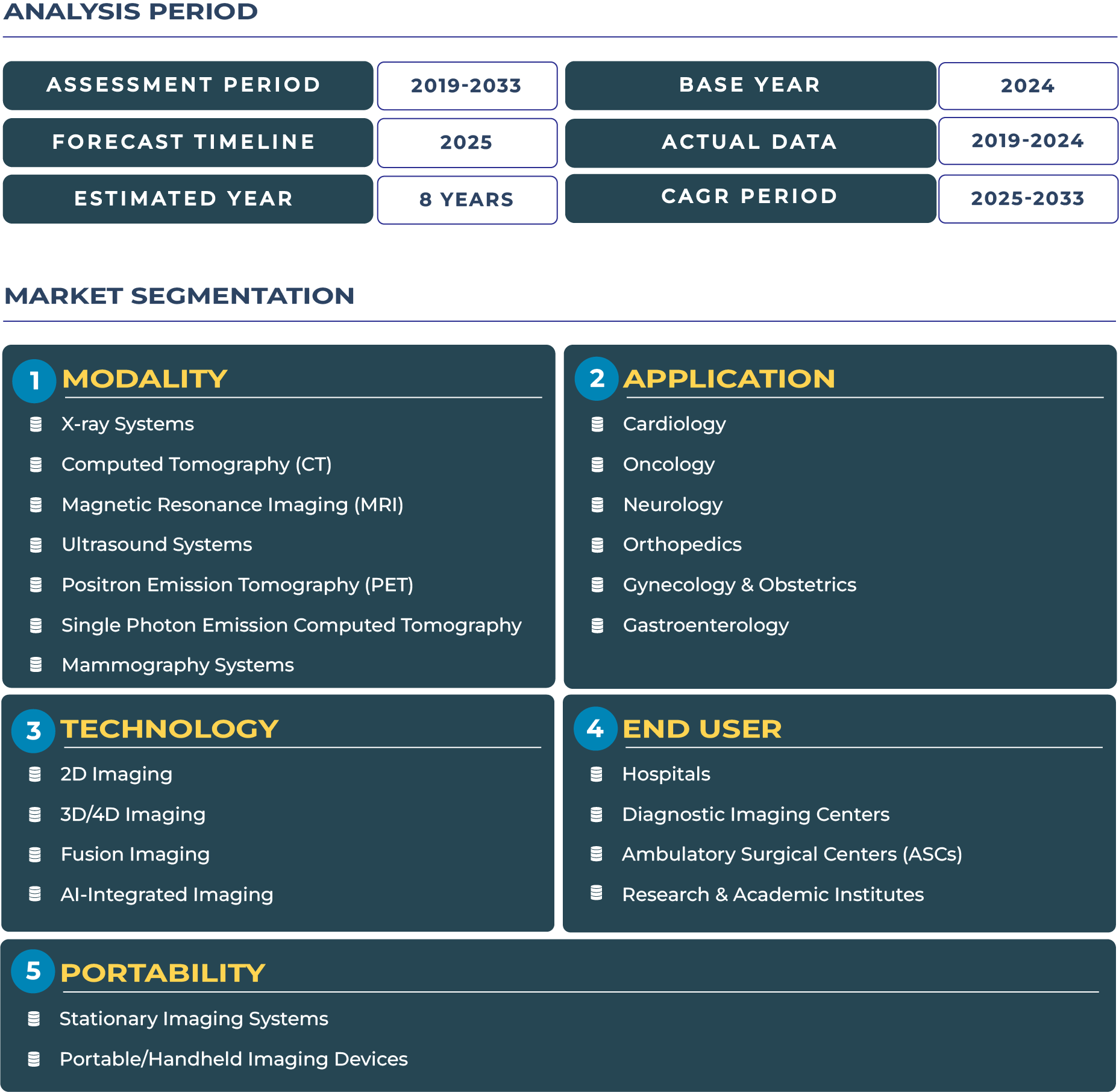Israel’s AI-Powered Imaging Revolution: Redefining the Diagnostic Imaging Devices Market Landscape
Israel diagnostic imaging devices market is undergoing a technology-driven transformation led by its thriving healthtech startup ecosystem and strong research-industry collaboration. The nation’s leadership in artificial intelligence (AI), data analytics, and medical software integration is positioning it as a global model for precision imaging innovation. Backed by an ecosystem of over 1,600 active life sciences and medtech startups, Israel’s hospitals are becoming live laboratories for the next generation of imaging diagnostics. According to DataCube Research, the market is projected to rise from USD 132.3 Million in 2025 to USD 215.1 million by 2033, growing at a CAGR of approximately 6.3% from 2025 to 2033. This growth is propelled by AI-enhanced CT, MRI, and PET systems, improved cloud-based imaging analytics, and the adoption of integrated diagnostic platforms across major urban hospitals such as those operated by Israel’s Ministry of Health.
Israel Diagnostic Imaging Devices Market Outlook: AI Startups and Academic Collaboration Driving Market Leadership
Israel diagnostic imaging devices industry is characterized by a unique blend of academic excellence, entrepreneurial vigor, and healthcare digitization. The country’s robust digital health strategy and strong support from the Israel Innovation Authority have resulted in a continuous stream of AI imaging startups such as Aidoc and Zebra Medical Vision, both of which have successfully commercialized deep learning-based radiology software integrated into clinical workflows. Hospitals like Tel Aviv Sourasky Medical Center are actively deploying these AI-assisted systems to improve image interpretation speed and diagnostic accuracy. Despite geopolitical tensions in the region, the healthcare technology sector remains resilient due to its export orientation and international collaborations. The ongoing adoption of hybrid PET/CT and MRI systems in tertiary hospitals, coupled with rising oncology and cardiovascular cases, continues to shape the market’s steady upward trajectory. These developments underscore Israel’s transition from being a technology innovator to a regional leader in advanced diagnostic imaging solutions.
Drivers & Restraints: Balancing Innovation Momentum and Regulatory Evolution
AI Ecosystem and Translational Research Fueling Growth
Israel diagnostic imaging devices ecosystem benefits immensely from its deep-rooted culture of translational research and innovation. Collaboration between academic institutions such as the Weizmann Institute of Science and commercial imaging companies has led to rapid proof-of-concept testing and technology adoption. Hospitals across Tel Aviv, Jerusalem, and Haifa are integrating AI-driven MRI and CT systems that reduce scan-to-diagnosis times and enhance physician efficiency. Moreover, Israel’s prominence as a hub for imaging AI startups is creating new export opportunities, enabling local innovations to reach hospitals in Europe, North America, and Asia. These technological strides, supported by government grants and venture capital inflows, are solidifying Israel’s position as one of the fastest-growing diagnostic imaging innovation clusters globally.
Limited Hardware Scale and Regulatory Hurdles Constraining Momentum
However, the Israeli diagnostic imaging devices sector faces constraints due to its relatively small domestic hardware market and evolving regulatory frameworks for digital health technologies. While the Ministry of Health is modernizing its digital health approval processes, lengthy certification cycles can delay commercialization timelines for startups seeking market entry. Additionally, imaging hardware imports remain concentrated among a few large players, limiting competition and pricing flexibility. The uneven distribution of advanced imaging modalities between urban and peripheral healthcare centers also creates service access disparities. These structural limitations underscore the need for streamlined regulatory coordination and broader hardware localization strategies to complement Israel’s software dominance.
Trends & Opportunities: Export-Led Growth and AI-Integrated Imaging Expansions
AI Integration and Global Commercialization Define Market Trends
The ongoing integration of AI imaging software into diagnostic hardware marks a major trend shaping Israel diagnostic imaging devices landscape. Companies are increasingly embedding AI algorithms directly into CT and MRI systems, allowing automated lesion detection, image segmentation, and workflow prioritization. Hospitals are transitioning from pilot deployments to permanent, revenue-generating installations. Israel’s rapid adoption of imaging informatics solutions and cloud-based radiology data sharing is setting new standards for operational efficiency. Moreover, a growing export orientation, where local imaging startups collaborate with global manufacturers, has made Israel a key innovation hub supplying software and analytics tools to global OEMs and radiology networks.
Strategic Opportunities for Global Partnerships and AI Bundling
Key opportunities lie in leveraging Israel’s clinical excellence and startup agility to create scalable international partnerships. By using domestic hospitals as testbeds, companies can fine-tune AI models before global rollout. For example, bundling AI diagnostic software with imported imaging hardware creates differentiated offerings that enhance buyer value and drive export competitiveness. Furthermore, expanding commercial relationships with European and U.S. hospitals can accelerate technology diffusion while positioning Israeli innovators as essential partners in the digital transformation of radiology. The establishment of international R&D collaborations, especially in neuroimaging and oncology diagnostics, remains a high-value opportunity for long-term growth.
Competitive Landscape: International Collaborations Reinforcing Israel’s Diagnostic Edge
The competitive landscape of Israel’s diagnostic imaging devices market is shaped by strategic alliances between multinational corporations and domestic startups. Companies like Siemens Healthineers and GE HealthCare actively support Israel’s digital radiology transformation through AI-assisted imaging and mobile diagnostic technologies. Local innovators such as Aidoc continue to forge global partnerships with hospitals and technology providers to commercialize their AI solutions in regulated markets. This synergy between global imaging manufacturers and Israeli AI developers reinforces the country’s reputation as a frontier in clinical imaging innovation.







